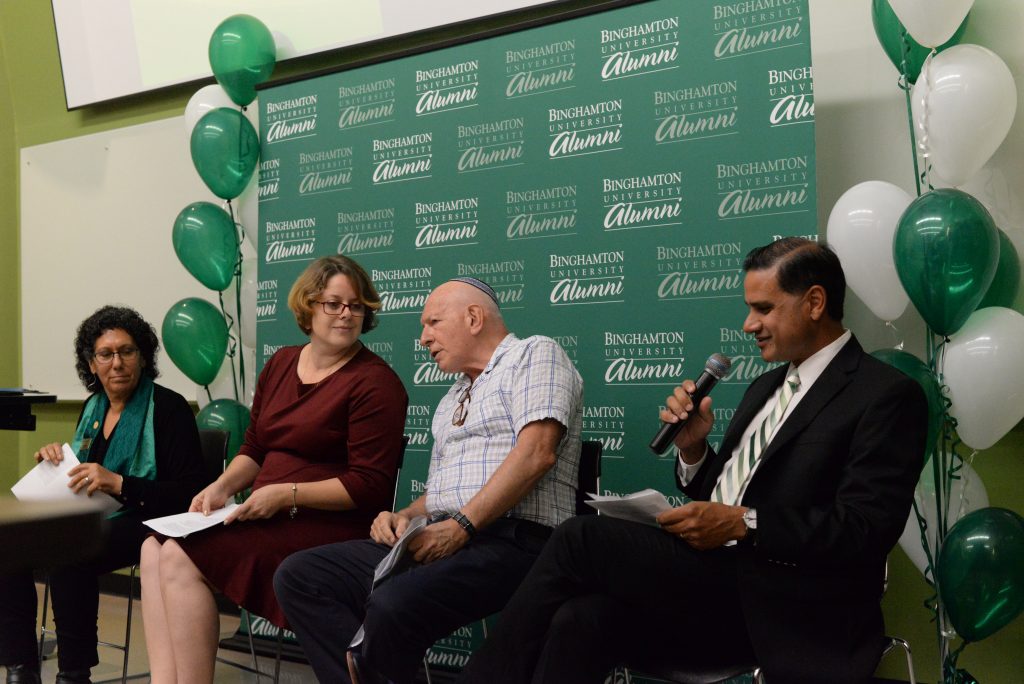
Three Harpur College alumni returned to Binghamton University for Homecoming Weekend with the goal of relaying stories of change they have brought to the world.
The talk, which was part of the BU Alumni Association’s TIER Talks series, was titled “Mission Possible: Alumni Changing the World.” It took place on Saturday in Lecture Hall 7 and featured Harpur College alumni working in varying fields. According to Steve Seepersaud, advancement communications manager for University Communications and Marketing, TIER Talks was created to keep graduates connected to the University.
“Since the Alumni Association created TIER Talks in 2014, the speaker series has leveraged distinguished alumni and faculty to address hot topics such as virtual and augmented reality, political polarization and the neuroscience of addiction,” Seepersaud wrote in an email. “The Alumni Association launched TIER Talks to meet the needs of Binghamton [University] graduates who wish to engage in meaningful lifelong learning and continue to experience the University’s rich intellectual content.”
The first speaker, William Schecter, ‘68, is a retired surgeon and professor emeritus of clinical surgery at the University of California, San Francisco. His talk, which was titled “Academic Global Surgery: A Moral Imperative,” focused on his work at Muhimbili University of Health and Allied Sciences in Tanzania. Schecter said his goal is to help bridge the gap in medical care between high-income and low-income countries, and he has worked to create a place in which people living in low-income areas can receive high-quality care.
In his talk, Schecter said the principles of his Jewish faith helped lead him to work toward increased medical access in low-income communities.
“In Leviticus, we are commanded to love our neighbors as we love ourselves and not to stand idly by the blood of our neighbors,” Schecter said. “This is true for everyone. How much more so is it true for those of us who actually have the education and the training to stop the bleeding.”
The second speaker was, Svetlana Iyer, ‘03, a behavior analyst who works with children with developmental disabilities. When she moved to India in 2011, she said she discovered that India was sorely lacking in specialists in behavior analysis. In response, Iyer founded Stepping Stones Center (SSC) in Bengaluru, India, a school and intervention center for children with autism and other developmental disabilities.
According to Iyer, SSC was not founded with the intention of causing any great degree of change, but merely to address the needs of the society around her.
“When we started Stepping Stones Center, it really wasn’t with a thought of making a huge difference or changing the world,” Iyer said. “It really started with one kid and with an intention to do something within my professional scope that will be impactful for that particular child and that family. And then it grew organically — it really just evolved when more needs presented themselves, and we were able to find answers to those needs.”
The final speaker was Nadia Rubaii, ’91, who is currently a professor of public administration at BU and co-director of the Institute for Genocide and Mass Atrocity Prevention (I-GMAP). Rubaii’s talk, titled “Could You or I Prevent a Genocide? We Can and We Must,” focused on how anyone is capable of preventing mass atrocities. According to Rubaii, the solution lies in focusing on the consequences of everyday actions.
“We need to assume that nothing we do is neutral,” Rubaii said. “Everything has consequences. And our decisions and actions can either contribute to prevention or they can contribute to the increased risk of atrocity.”
The talk was attended by alumni, faculty and staff. George Shafer, ‘68, chose to attend the talk based on the title, and said was intrigued to hear from fellow alumni.
“I’m open to whatever it is,” Shafer said. “I’m interested to hear what some people are doing to try and change the world right now and correct some terrible things that are going on in it.”
Another attendee, Steven Appel, ‘72, said he attended because he was interested in the global scale of the speakers’ experiences.
“I expect[ed] to hear three well-traveled, well-accomplished people talking about their experiences around the world,” Appel said.


